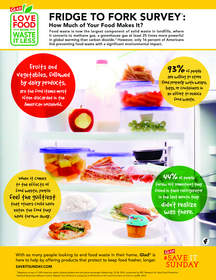MISSION, KS--(Marketwired - Oct 24, 2013) - (Family Features) Food waste is a major global issue that affects the environment, economy and food security. According to a 2012 report by the National Resources Defense Council, American families throw out 25 percent of the food they buy. That's roughly the equivalent of $1,500 wasted each year.
Chef Alex Guarnaschelli, who participated in Food Network's "The Big Waste" special and serves as a judge on "Chopped," is encouraging food enthusiasts to love food more and waste it less, one day at a time.
"One of the most important steps we can take in an effort to reduce food waste is prepping ingredients properly right from the start," Guarnaschelli says. "Just take time on Sunday, the day when most people grocery shop and prep for the week ahead, to wrap and protect foods to help keep food fresh all week. This, combined with other steps like planning ahead and using leftovers can go a long way in trimming food waste."
According to Glad Food Protection's recent Fridge to Fork report, two-thirds of Americans throw away food weekly or more frequently. Follow these few easy preparation and protection tips to help save time, money and the environment:
- Look beyond looks: Nothing's perfect -- fresh fruits and vegetables included. Often, anything with bruises, bumps or oddities gets picked over. But a misshaped tomato could end up being the firmest and tastiest of the bunch. Don't be afraid to buy something imperfect, you may be surprised.
- Prep and protect: Food spoils in homes due to improper or suboptimal storage, poor visibility in refrigerators, partially used ingredients and misjudged food needs, according to the National Resources Defense Council report. Taking easy steps to prep and protect food before storing helps keep food fresher longer. For example, keep kale crisp by wrapping in a paper towel, storing in an airtight Glad Zipper bag and placing in the coldest part of the fridge.
- Leftover do overs: Don't scrap today's leftovers or excess ingredients; use them for tomorrow's meals. Extra baked or rotisserie chicken? Debone and shred what's left, and store it in an airtight container to later make chicken enchiladas the whole family will enjoy. Leftover cooked veggies? Use them as the base for a slow cooker meal.
- Play musical shelves: When you purchase new food, shuffle the older items to the front, putting the newer items towards the back. You'll be prompted to use these items first, before they go bad.
- Lead with the list: Plan meals ahead for a trip to the store. A detailed list will help curtail impulse purchases and over-buying. Be realistic about what you're going to prepare, accounting for days you'll eat leftovers or go out.
You can find more food preparation and protection tips on SaveitSunday.com, where you can take the #SaveItSunday pledge and check out other ideas to help trim food waste at home. By pledging, you'll be entered for the chance to win a meal for you and your friends cooked in your home by a personal chef.
About Family Features Editorial Syndicate
This and other food and lifestyle content can be found at www.editors.familyfeatures.com. Family Features is a leading provider of free food and lifestyle content for use in print and online publications. Register with no obligation to access a variety of formatted and unformatted features, accompanying photos, and automatically updating Web content solutions.
Contact Information:
Vickie Rocco
vrocco@familyfeatures.com
1-888-824-3337
http://editors.familyfeatures.com
